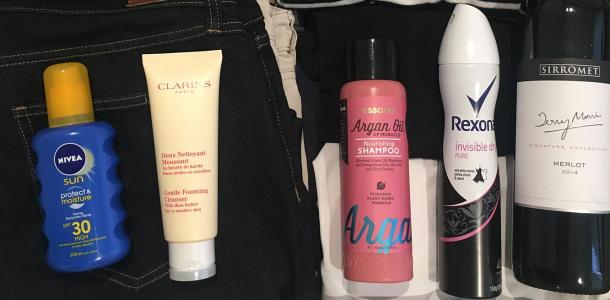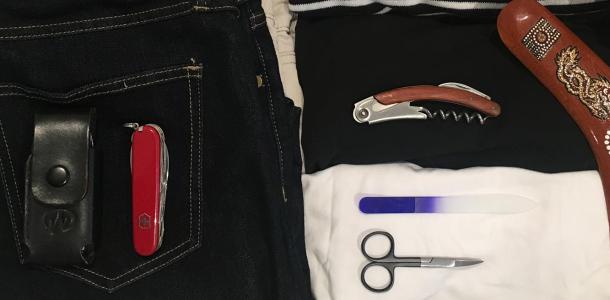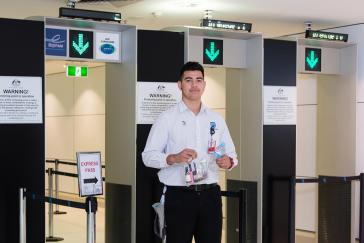The number one priority for Brisbane Airport is getting you safely and securely to your destination.
Security screening regulations at Brisbane Airport are specified by the Australian Government to ensure the safety and security of all airport users and passengers.
The Australian Government requires that everyone (including passengers, visitors, aircrew and airport workers) must go through security screening before boarding a flight or moving into secure areas at Brisbane Airport.
Under these regulations, screening is compulsory, and you are unable to choose how you are screened. If you refuse to be screened, you will not be able to enter the secure area of the airport for 24 hours.
The below information includes the process for:
- Screening of personal items
- Screening of persons
- Screening of passengers requiring assistance
- Screening for assistance animals
All items you plan to carry onto the plane or take into the secure areas of the terminals will be screened.
To make this process easier for everyone we recommend:
- Not packing any prohibited or dangerous goods in your baggage. You can check whether an item is prohibited by visiting your airline’s web page, the Civil Aviation Safety Authority website or the TravelSECURE Website
- Placing valuables and loose items such as your laptop, phone, wallet, sunglasses, passport or boarding pass, jewellery and camera inside your carry-on bag prior to arriving at the screening point
- For international flights (only), placing powders, liquids aerosols and gels into a clear snap lock bag for screening
- Advise security staff of any medical conditions, items, devices and implants or if you require any additional assistance
- Remove ALL items from your pockets, bulky outer-wear and belts
- Follow the instructions of all airport staff through this screening process.
If you’re found to be carrying any dangerous, prohibited goods or liquids, aerosols and gels over the restricted amount, these will need to be surrendered before you can proceed to the secure area of the terminals. No items will be kept, returned or on-forwarded to you. Security screening officers have the final say about whether you can carry an item on board an aircraft.
Individuals must be screened and cleared at a screening point before proceeding to the secure area, boarding gate, or flight.
If the detector alarms, you may be subject to further screening before being cleared from the screening point. Additional screening can take place using a hand-held metal detector, Explosive Trace Detection (ETD) and frisk search. Security screening officers have the final say about whether you can board an aircraft.
If you are required to complete a frisk search to be cleared, you will be asked to provide consent before this process starts. The screening officer will offer for the frisk search to be completed in a private room or at the screening point. Frisk searches are completed by an officer of the same gender. If you would prefer to have the frisk search completed in a private room, you may ask to have a support person accompany you.
Read more about the screening methods employed by Australian Airports.
Explosive Trace Detection (ETD) machines operate at random in in Brisbane Airport’s screening areas. If you are selected for an Explosive Trace Detection test, you, your carry-on bags and your clothing may be swabbed for analysis.
We understand that some people may have specific needs or require assistance at the screening point.
Before you begin the screening process, if you need help or if you have a prosthetic, medical device, or medical equipment, tell the screening officer. Under directions made by the Australian Government, individuals are unable to select the method of screening. If you have concerns about a screening process or have a medical condition that may be impacted by screening, it is recommended that you speak with your legal medical practitioner prior to travel and obtain a signed letter outlining your specific circumstances.
If you wear any medical device or equipment, the screening officer will not remove, attempt to remove, interfere with, or ask you to remove the device or equipment.
A screening officer may request consent to inspect a medical device or implant if required to complete screening.
For more information about screening processes for travellers requiring assistance visit the Department of Home Affairs TravelSECURE website.
Assistance animals will also need to be screened. This will include their lead, collar and harness. You do not have to be separated from your animal at any time throughout the screening process.
Brisbane Airport is a child-friendly environment and our staff try to accommodate families as much as possible, particularly through the security screening process.
It is a requirement by law that babies and infants go through similar screening to adults.
- Babies can be carried by an adult or, if they can walk, they should walk through the screening point on their own
- Strollers and prams must be screened along with other carry-on baggage. Many airlines do not allow these items in the cabin due to space and stowage constraints. If you are unsure about your carry-on requirements, check with your airline before you travel
- On domestic flights, there is no limit to the volume of powders, liquids, aerosols or gels that you can take on board in your carry-on baggage
- For international flights, you are able to carry on board a reasonable quantity of inorganic powder, liquid, aerosol or gel items for a baby or infant. Pack only what you need for the duration of your flight and any delays that may occur. There are no quantity restrictions for organic powders such as powdered baby formula.
Read more information about travelling with children and what is considered a reasonable quantity of inorganic powders, liquids, aerosols or gels.



